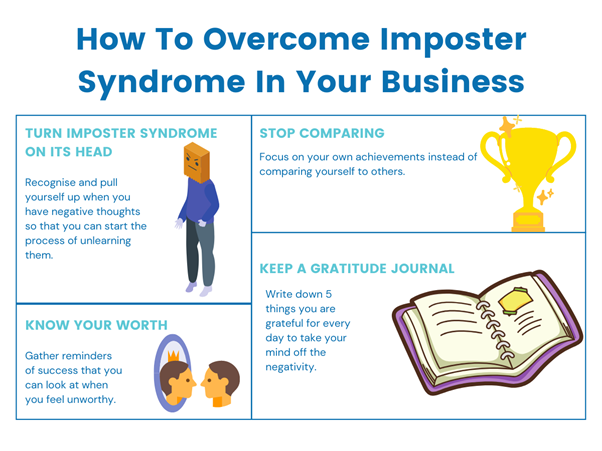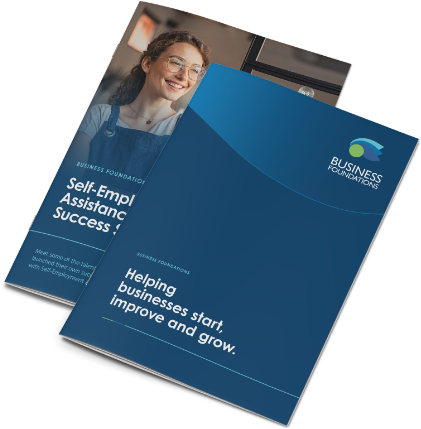Overcoming Imposter Syndrome In Business
November 19, 2021
Impostor syndrome refers to the phenomenon when an individual internalizes their accomplishments, due to fear of being exposed as a “fraud.”
Those with imposter syndrome are psychologically uncomfortable with acknowledging their role in their own success, but their negative thoughts are based on anxiety, rather than objective facts.
These feelings can happen to anyone, although it is especially prevalent in the workplace. Entrepreneurs are one of the largest groups to wrestle with feelings of worth, achievement and self-esteem.
No matter how successful entrepreneurs are on the outside, it is very common for them to feel as though they don’t fit in with their peers.

Impostor Syndrome Signs
Let’s take a look at exactly what thoughts run through the minds of people with Impostor Syndrome. Do any of these sound familiar?
- You have difficulty accepting praise and compliments
- You tend to discount your success and achievements
- You sometimes avoid showing confidence
- You have dismissed your success for luck instead
- You feel others overvalue your success
If you said yes to more than two of these statements, you have likely experienced a form of impostor syndrome.

How to Take Down Imposter Syndrome
Turn Imposter Syndrome On Its Head
The good news is that just by recognizing certain thoughts or feelings, it can help you stop them. If you hear yourself say, “I don’t deserve this,” or “It was just luck this happened,” pause and take note that you are having impostor syndrome thoughts.
Know Your Worth
Sometimes we forget that we are worth it. If you know you have imposter syndrome tendencies, start to gather success reminders. These can be emails from colleagues, letters from family or friends or even pictures of a time you felt proud.
Stop Comparing
Focus on measuring your own achievements instead of holding them up against others’. Comparing your own life to a carefully curated entrepreneur’s social media feed, is a trap for feeling like you don’t measure up.
Keep A Gratitude Journal
Nothing grounds you more than writing down what you are grateful for. Journaling has been proven to be a great remedy for impostor syndrome by simply getting those good juices flowing. When you are feeling those self-doubts, write down five things you are grateful for.

Real Life Imposter Syndrome
Tony Fitzgerald joined our NEIS Program in April 2021 with his business Predicting Better. A company that offers courses and workshops to psychologists, psychotherapists, counsellors and coaches who are seeking to bring about mental recovery and optimal performance for their clients.
Tony wanted to set up a podcast series for his new business on how the brain constructs emotions, fears, anxiety and trauma; and the next generation of treatments and tools to recover wellbeing using this understanding.
His business advisor, Eric suggested that he start engaging some of the authors and authorities in this area to generate interest and connect with the leaders in the space.
After feeling inspired by a researcher on YouTube that would be a great fit for his podcast, the thought then loomed on him that he had no official footprint in the industry.
After feeling like a ‘fraud’, with no website or even official email address – he momentarily dismissed the whole idea due to a real fear of rejection.
However, due to all the mindset work Tony had done, it allowed him to stay in touch with the purpose of his mission which is to help people connect with a better version of themselves. After gaining the courage and reaching out, he received a reply within 24 hours expressing their interest.
This guest was also working with others who were also great fits for his new podcast series!
You can learn more about Predicting Better here.

Acknowledgement Of Country
Business Foundations acknowledges the traditional custodians throughout Western Australia and their continuing connection to the land, waters and community. We pay our respects to all members of the Aboriginal communities and their cultures; and to Elders both past and present.
Victoria
The Commons
80 Market Street,
South Melbourne VIC 3205
admin@businessfoundations.com.au
Western Australia
Wesley Central
2 Cantonment Street,
Fremantle WA 6160
admin@businessfoundations.com.au


Get In Touch
Have a question or to find out how we can help you, please get in touch.






